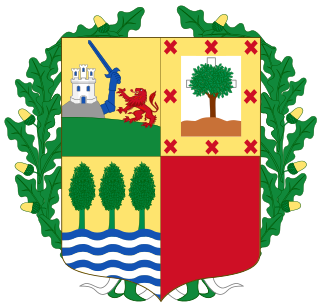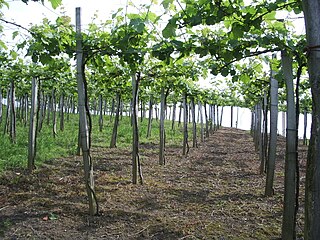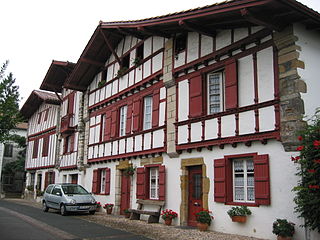
The laia (Spanish : laya) is a two-pronged type of foot-plough used in the Basque Country. Aside from being a farming implement, it is also used in laia racing. The people using a laia are referred to as laiariak in Basque.

The laia (Spanish : laya) is a two-pronged type of foot-plough used in the Basque Country. Aside from being a farming implement, it is also used in laia racing. The people using a laia are referred to as laiariak in Basque.

The word is also attested as lai, without the absolutive ending [1] [2] but is mainly used in the form of laia today. Other forms include lain (Oiartzun) and laixa (Eibar). [3] Beyond that the etymology is not entirely clear, but a connection with names for other forked implements in other neighbouring Romance languages such as the Béarnese word layà (a forked instrument for gathering chestnuts) seems plausible. [3]

Basque is a language spoken by Basques and other residents of the Basque Country, a region that straddles the westernmost Pyrenees in adjacent parts of northern Spain and southwestern France. Basque is classified as a language isolate and the only language isolate in Europe. The Basques are indigenous to and primarily inhabit the Basque Country. The Basque language is spoken by 806,000 Basques in all territories. Of these, 93.7% (756,000) are in the Spanish area of the Basque Country and the remaining 6.3% (50,000) are in the French portion.

Gascon is the vernacular Romance variety spoken mainly in the region of Gascony, France. It is often considered a variety of Occitan, although some authors consider it a different language.

Olentzero is a character in Basque Christmas tradition. According to Basque traditions, Olentzero comes to town late at night on 24 December to drop off presents for children. In some places he arrives later, for example in Ochagavía – Otsagabia on the 27th and in Ermua on the 31st.

The President of the Basque Government, usually known in the Basque language as the Lehendakari, is the head of government of the Basque Autonomous Community. The lehendakari leads the executive branch of the regional government.

A digging stick, sometimes called a yam stick, is a wooden implement used primarily by subsistence-based cultures to dig out underground food such as roots and tubers, tilling the soil, or burrowing animals and anthills. It is a term used in archaeology and anthropology to describe similar implements, which usually consists of little more than a sturdy stick which has been shaped or sharpened and sometimes hardened by being placed temporarily in a fire.

Txakoli or chacolí is a slightly sparkling, very dry white wine with high acidity and low alcohol content produced in the Spanish Basque Country, Cantabria and northern Burgos in Spain. Further afield, Chile is also a minor producer.

The foot plough is a type of plough used like a spade with the foot in order to cultivate the ground.
The Basque alphabet is a Latin alphabet used to write the Basque language. It consists of 27 letters.

Getaria is a town on the Urola coast, in the province of Gipuzkoa, in the autonomous community of the Basque Country, in northern Spain. It borders Zarautz to the east and Zumaia to the west.
Communist Movement of Euskadi was originally the branch of the Communist Movement (MC) in Basque Country and Navarre, Spain. EMK was previously known as ETA Berri, a splinter group of ETA. EMK separated itself from MC in 1983. In 1991 EMK merged with LKI and formed Zutik in Basque Country. In Navarre EMK took part in forming Batzarre. Some of its most prominent leaders were Patxi Iturrioz, Eugenio del Río, Rosa Olivares Txertudi, Milagros Rubio, Jesús Urra Bidaurre and the brothers Javier and Ignacio Álvarez Dorronsoro.

Basque rural sports, known as Deportes Rurales in Spanish or Herri Kirolak in Basque, is the term used for a number of sports competitions rooted in the traditional lifestyles of the Basque people. The term force basque is used in French.

Basque surnames are surnames with Basque-language origins or a long, identifiable tradition in the Basque Country. They can be divided into two main types, patronymic and non-patronymic.

Basque dialects are linguistic varieties of the Basque language which differ in pronunciation, vocabulary and grammar from each other and from Standard Basque. Between six and nine Basque dialects have been historically distinguished:

Resurrección María de Azkue was an influential Basque priest, musician, poet, writer, sailor and academic. He made several major contributions to the study of the Basque language and was the first head of the Euskaltzaindia, the Academy of the Basque Language. In spite of some justifiable criticism of an imbalance towards unusual and archaic forms and a tendency to ignore the Romance influence on Basque, he is considered one of the greatest scholars of Basque to date.

Erromintxela is the distinctive language of a group of Romani living in the Basque Country, who also go by the name Erromintxela. It is sometimes called Basque Caló or Errumantxela in English; caló vasco, romaní vasco, or errominchela in Spanish; and euskado-rromani or euskado-romani in French. Although detailed accounts of the language date to the end of the 19th century, linguistic research began only in the 1990s.

The ikurrina flag or ikurriña is a Basque symbol and the official flag of the Basque Country Autonomous Community of Spain. This flag consists of a white cross over a green saltire on a red field.

The Villano de Las Encartaciones is a Spanish breed of large working dog from the region of Las Encartaciones in the province of Biscay, in the Basque country; it is found also in Álava, in eastern Cantabria and in northern Burgos. The traditional use of the dogs is in management of the Monchina breed of cattle of Cantabria and the País Vasco, and particularly to assist with bringing the cattle down from the mountain pastures between October and December. In 2009 there were fewer than 200 dogs registered in the studbook.

In the Spanish public discourse the territory traditionally inhabited by the Basques was assigned a variety of names across the centuries. Terms used might have been almost identical, with hardly noticeable difference in content and connotation, or they could have varied enormously, also when consciously used one against another. The names used demonstrate changing perceptions of the area and until today the nomenclature employed could be battleground between partisans of different options.
Laia may refer to: